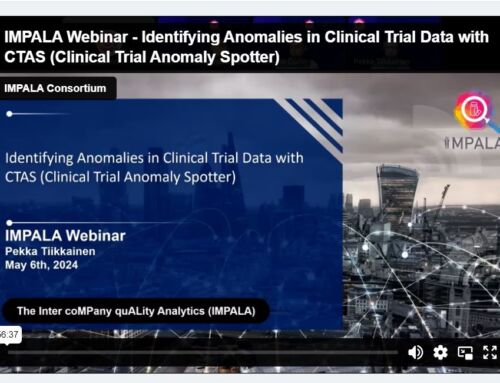As we wrap up 2024, the IMPALA Consortium reflects on a year of significant progress and achievements in its mission to transform quality in biopharma through the implementation of advance analytics. This year has been marked by impactful work products, exciting new initiatives, and valuable industry collaborations that have further solidified IMPALA’s role in shaping the future of biopharma quality. We are excited to share highlights from our key accomplishments and look forward to continuing this momentum into 2025.
In 2024, the IMPALA Consortium has made significant advancements in its work products and publications. Key accomplishments include the release of the Clinical Time series Anomaly Spotter (CTAS) by the Anomaly Detection in Clinical Data Work Product Team (WPT), an open-source R package that identifies anomalies in clinical trial data to enhance statistical monitoring. In addition, the Education WPT published the “Data Analytics for Quality Assurance in Pharmaceutical Development Framework,” offering valuable guidance on leveraging advanced analytics to improve Good Clinical Practice (GCP) and Good Pharmacovigilance Practice (GVP.) IMPALA launched its Podcast Series, with six episodes released and more in the pipeline. These episodes provide an opportunity for member representatives to discuss various topics relevant to the biopharma industry and share these thoughts across industry. IMPALA also introduced versions 5 and 6 of the simaerep package, allowing detection of both under-reporting and over-reporting of clinical events, as well as an alternative algorithm that identifies patient-level matches for bootstrapping and can be executed within a database backend. These updates provide more comprehensive quality monitoring at the site level and reflect IMPALA’s commitment to meet the evolving needs and capabilities of the industry and provide ongoing value and relevance. IMPALA’s recent publication in RQA QUASAR #169, authored by the Audit Site Selection WPT explored the evolution in data-driven clinical site audit selection, underscoring the transformative shift in quality assurance practices.
IMPALA has launched two new initiatives to address emerging challenges in the industry. The AI Powered Regulatory Intelligence Work Product Team aims to streamline the process of monitoring and implementing evolving regulatory guidelines using AI to analyze new changes at scale and highlight the impact of these regulatory changes on the QMS landscape to ensure compliance. Meanwhile, the RAPID Audit Work Product Team focuses on creating a data-driven audit methodology that leverages advanced analytics to efficiently assess processes, identify systemic issues, and provide insights into GCP and GVP compliance at scale. IMPALA has also continued to expand its industry presence with nine sessions across prominent events such as RQA, DIA Global, DIA China, Clinical Data Analytics, FIERCE Clinical Summit, and its own IMPALA webinar. In addition to gaining visibility and recognition, these sessions have allowed IMPALA to engage with the broader industry and gather valuable feedback on the needs and challenges faced by clinical trial professionals, as well as connect in-person with the peers they have been working with through IMPALA.
Looking ahead to 2025, IMPALA is committed to continuing the delivery of valuable products that can help quality in the biopharma space. As the landscape changes, IMPALA is expanding its focus beyond advanced analytics to include digital leadership, recognizing that data and digital tools are interconnected and mutually reinforcing. By incorporating digital tools, automation, and AI into its initiatives, IMPALA aims to enhance its impact not only in quality assurance but across the entire biopharma quality domain. In addition, while IMPALA has focused it’s efforts mainly in the GCP space to date, it plans to increase its focus in the GVP space starting in 2025 in order to drive meaningful impact in the post marketed pharmacovigilance domain. To support this growth, IMPALA will refine its operational model by developing committees dedicated to communications, engagement, education, and adoption to ensure strategic impact and more effective implementation of its work products across industry. IMPALA also aims to strengthen its engagement with health authorities through its new membership tier, to allow for formal input and to further increase the impact and value of the work within the industry.
IMPALA extends its heartfelt thanks to all the individuals and organizations involved in its successes so far and looks forward to a successful 2025 and beyond.
Contact us at info@impala-consortium.org to find out more about how you can get involved.




